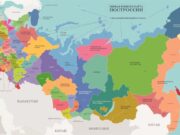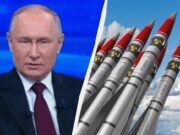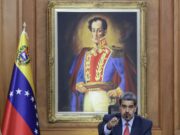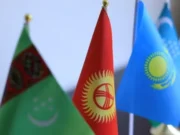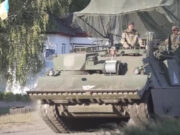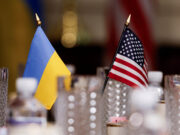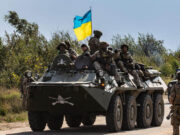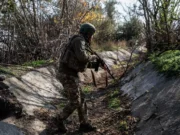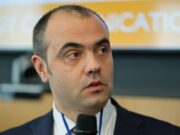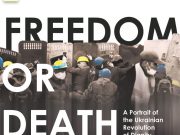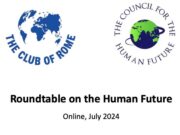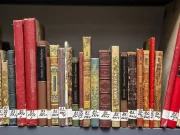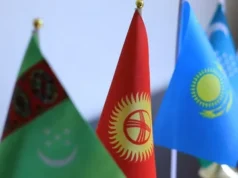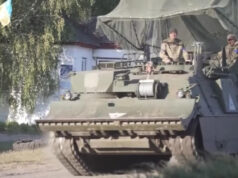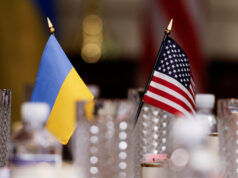Kyiv. 27-th of April 2015 (PolitCom, Volodymyr Zadyraka). A Critique of the ‘Red Putinist’
A person of influence on the thinking the western left on Ukraine has been the Russian writer Boris Kagarlitsky Director of the Institute of Globalization and Social Movements. Whilst the pro-war views of the Moscow based Kagarlitsky have been accepted without criticism in some quarters – in contrast the views of actual members of the Ukrainian labour movement on Ukraine have been given no such level of recognition. Published below exclusively by the Ukraine Solidarity Campaign is an important critique of the ‘Red Putinist’ Kagarlitsky from Nihilist Ukrainian left-wing website and activist network.
Kill, kill, kill
Already last year Kagarlitsky encountered criticism of his pro-Kremlin and pro-war position towards Ukraine. The Ukrainian-Russian left activist, Denis Denisov has written an open letter in which he stated that he is ending his collaboration with one of the website belonging to Kagarlitsky’s media group Rabkor.ru. The young Crimean Trotskyist cited his profound conviction that Kagarlitsky’s political line hinders peace in Ukraine. At that point Rabkor.ru was forced to formulate its views more precisely, which is typically done by Kagarlitsky himself. It should be noted that Denisov’s letter was addressed to Kagarlitsky directly as the de facto editor of the web portal. In its reply to Denis Denisov the ‘editorial board’ of Rabkor.ru write:
‘The end of the civil war in Ukraine can be achieved by way of a radical political reform, by way of equal determination of all peoples and regions constituting the country, by way of a dialogue between the parties to the conflict. But this, in turn, is not possible until the Kiev government recognises its own defeat in its war against the revolting South-East. But until the former is not prepared to do so, and continues the war, relying on support from the West, there is no way towards peace other than resistance. If the Russian government is presently supporting this resistance, then this must be used. Never mind that this support is completely inadequate and not especially genuine — if it were not for the growing pressure from society and for the growth of the self-organising movement of solidarity with Novorossia on the territory of Russia, we would already have witnessed a deal between the Russian and Ukrainian oligarchs’.
Let’s begin from the fact that the set phrase ‘the revolting South-East’ is rather a propaganda cliché than a reflection of reality. The wider ‘South-East’, or the so-called Novorossia, about which Putin began speaking publicly from the middle of 2014, has not, in fact, materialised. At the time this was first mentioned, the Kremlin propagandists spoke about eight or nine oblasts which would separate from the centre and become the counterweight to ‘historical Ukraine’ in the North-West of the country. In the majority of the potentially rebellious regions this project has foundered.
As we can see, for Kagarlitsky peace can only come after the defeat of Kiev. By ‘equal determination’ we can surmise Putin’s idea of federalisation of Ukraine — The right of one region, governed by self-appointed opportunists, to impose its position on the vast majority of the population of Ukraine, which is categorically opposed to any closer relations with Russia. It is notable that at that point the leadership of the Donetsk People’s Republic (DNR) were Russian passport-holders. In other words, Russian imperialists would have received veto power in the internal and external politics of Ukraine. As we can see, in the text there is not only the Kremlin’s ideological clichés, but a call to use the ‘support’ of Russia. Note that the ‘editorial board’ of the site managed by Kagarlitsky points to the ‘self-organising movement of solidarity with Novorossia’ — here the author is stating something he himself simply cannot, in all honesty, believe.
The main organisation that stands behind the wiping up of Russian military hysteria, the National-Liberation Movement, is not only an extreme rightwing nationalist group, but an organisation that receives money from the Kremlin and is led by Evgeny Fedorov — a Duma MP from the ruling United Russia party. In 2014, this good soldier of Putin became famous for calling for an assault on the remaining liberal media. Even before the crisis in Ukraine, he publicly put forward an initiative to withdraw from the Russian constitution the clause barring state ideology and the priority of international law above the Russian law, having called the Constitution a ‘colonial utilisation manual’. Fedorov’s assistant is a certain Andrey Kovalenko, who heads the Moscow branch of the far right organisation Eurasian Youth Union, which is part of the wider Eurasian Movement headed by Aleksandr Dugin, who became infamous for his earlier statement that ‘Ukrainians must be killed, killed, and killed; I tell you this as a professor’. Kovalenko’s organisation had received hefty financial support from the Kremlin long before the outbreak of the war. Instead of ‘self-organisation’ we see, in fact, a structure that unites the ‘ideological neighbours’ of Russian nationalists (this is the way the EYU is categorised by the human rights organisation ‘Sova’) and Russian paleo-conservatives under the wing of the Kremlin.
Kovalenko himself has become celebrated for a video in which he calls on Putin to issue his command to ‘fetch’ (as to a dog — HC).
Similarly, extreme rightwing and nationalist Liberal Democratic Party of Russia (LDPR) and Communist Party of Russia (KPRF) have become instrumental in such “self-organisation”. These parties declare their oppositionist credentials but have long since become part of the system of government. The leaders of these political parties, Zhirinovsky and Zyuganov, are playing the roles of raving lunatics who are meant to underline the relative sanity of Putin. In other words, the ‘editorial board’ of Rabkor.ru recommends supporting the Russian nationalists, who are ‘seemingly’ forcing the Kremlin’s hand towards intervention and military support. In other words, Kagarlitsky’s site is in effect calling for the support of a movement that is even more reactionary than the Kremlin. He is calling SPECIFICALLY for a military defeat of Ukraine. Is this really a way towards peace? Somehow it does not seem so.
Kagarlitsky’s Hawkish “blindness”
The Polish socialist and Ukraine specialist, Zbigniew Kowalewski, in his article “Ukraine: Russian White Guards in the Donbas” laments Kagarlitsky’s fantasies:
’[On April 22, Boris Kagarlitsky affirmed that “the successful uprising of hundreds of thousands (and perhaps millions) of people in eastern Ukraine is not to be explained on the basis of Russian interference”. An uprising of hundreds of thousands, even millions? Even the propaganda of the Russian regime aimed at people abroad, with the channel Russia Today in the forefront, is a thousand times more measured. On the international left, almost nobody knows Russian, and even less Ukrainian; so when the left wants to know what is happening in Ukraine, it finds itself in a catastrophic situation. So as not to depend on the Western media, it is condemned to have recourse to the English-language propaganda of the Putin regime and to that of the so-called “anti-imperialist networks” which are pro-Russian (often “red-brown” or downright brown) as well as what is translated into English by the journal Links – a site, to be precise, which has provided publicity for Kagarlitsky’s writings concerning this great mass uprising that does not exist’.
We can only imagine that Kagarlitsky, the refined intellectual, has been so deeply engaged in academic Marxist research that he simply is unable to notice the imperialist foreign policy, the fascism-infiltration of society and the managed nature of the militarist hysteria in Russia. Yet, it is difficult to agree that he does not know. Marxism is a materialist framework, which cannot ignore facts of political life, and must study them. High theory and ‘dialectics’, removed from practice, are signs of idealism; the machiavellian adjustment of reality to previously formulated conclusions points to ultimate subjectivism and an anti-scientific nature of any such theory. This may, in fact, be described as ideology (in Marxist terms), i.e. a form of false-consciousness. We are, therefore, not dealing with Marxism, but with plain-and-simple anti-Marxism.
Thus Kagarlitsky, the enemy of the left, does not only see an uprising where there is none, but fails to see the right wing extremists in front of his nose. In the West he acts on behalf of the reactionary imperialist policy of Russia preferring to mask his relationship with the pro-Kremlin rightwing extremists. For example, on 27 August 2014, Boris Yul’evich (Kagarlitsky — HC) took part in an public meeting in London, entitled ‘How to stop the spread of war’, alongside Tariq Ali, Lindsay German, Jeremy Corbyn, Owen Jones, Francesca Martinez, Stafford Scott, Kate Smurthwaite, and Christian Fuchs. Anton Shekhovtsov, a scholar of Russian and Ukrainian rightwing extremism notes:
’In Russia, however, Kagarlitsky prefers different company. …Kagarlitsky took part in a meeting of Russia’s far right Florian Geyer Club (Third Reich’s 8th SS Cavalry Division, which was deployed on the Eastern front in 1943–44 – HC), which is headed by a rightwing islamist Geydar Dzhemal. This Club is often frequented by Russian fascists, such as, for example, Aleksandr Dugin, Maksim Kalashnikov and Mikhail Leontiev, the Sweedish anti-Semite Israel Shamir and the Italian national-Maoist Claudio Mutti, among others.
Kagarlitsky (and Richard Brenner) also took part in the conference ‘Global Crisis and the Conflict in Ukraine’, which took place in the recently annexed by Russia city of Yalta on 6–7 July 2014. One of the organisers of the conference was the Institute of Globalisation and Social Movements (founded and led by Kagarlitsky — HC). The other organiser of the conference — the extreme nationalist ’New Rus’’, headed by Alexey Anpilogov — recently hosted another conference, entitled ‘Russia, Ukraine, New Russia: Global Problems and Challenges’, which included among its invited guests such foreign fascists as Frank Kreilman (Flemish Interest), Luk Michel (Belgian far right national-Bolshevik party ‘Pati Communautaire National-Européen’), Márton Gyöngyösi (Hungarian extreme rightwing or neo-Nazi party Jobbik), Roberto Fiore (Italian extreme rightwing party ’Forza Nuova’), Mateusz Piskorski (Polish populist rightwing party Samoobrona), and Nick Griffin (the far right British National Party). (Although only Piskorski and Fiore managed to come on this occasion).
Last year Shekhovtsov also published in his blog a photo in which seated at the same table at a drinking establishment are Kagarlitsky with Alexey Belyaev-Gintovt (prominent member of Aleksandr Dugin’s International Eurasian Movement), Yevgeniy Zhilin (leader of the extreme rightwing militia Oplot), Konstantin Krylov (far right politician, one of the organisers of the Russian Social Movement — Russia), right-conservative publicist Yegor Kholmogorov and Ukrainian journalist Aleksandr Chalenko. The latter now lives in Moscow and calls for a full-scale Russian occupation of Ukraine, reassuring his Moscow interlocutors and readers that Ukrainians will not put up serious resistance and will quickly learn to live with the policies of the military forces. The main thing is to capture Kiev quickly enough.
In the more recent period the Kagarlitsky-controlled Rabkor.ru has often published interviews with and reports about meetings with the monarchist leader of some Russian far rightists, Igor Strelkov-Girkin. This is the same White Guard who, last year, helped to capture Sloviansk and whom his own companion in arms ‘people’s mayor’ [of Slovyansk — HC], [Vyacheslav] Ponomaryov, accuses of theft and executions. This war criminal and reactionary is labelled as ‘White Guard Leftist’ by the website. Strelkov himself considers any sign of opposition to the authorities in Russia in the classic terminology of conspiratorial thought:
’All “outbursts” of discontent in Moscow or St Petersburg are secretly financed form abroad. Of course, “money for the revolution” is not given to the marionettes directly by their masters. This money is issued by the local (“democratically oriented”) sponsor-oligarchs… since their interests are inseparable from the Jewish-Anglo-Saxon international capital, of which it is just a branch’.
Kagarlitsky has been friendly with the hawks who propagate aggression and war, and it would not be unwise to assume he is a hawk. Moreover, the Institute of Globalisation and Social Movements, headed by him, is backed financially by the Russian government. Aside from the Institute, Presidential Grants were also given to the Centre for Political Technologies (the foundation tasked with developing the ‘conservatism for development’ doctrine), foundation St Petersburg Politics, and Institute for the Urban Economy. Apropos the category of ‘youth projects’, the most significant financing from the government has been allocated to the pro-Kremlin biker club Night Wolves.
Russian national-socialism needs money, and the state of the property owners needs a reactionary ideology. The Kremlin hands out the money, but it does not need to call itself ‘conservative’. Selective blindness to the state’s true intentions is not a hindrance as long as what you do is provide the ruling party with what it needs and service those needs accordingly. Leftists engaged in this kind of game are not only not hampering the regime, they are its auxiliary feature.
Solid Relations
The love affair between Kagarlitsky and the Kremlin has been developing over a long period now, and we can identify milestones in this relationship by a dotted line. Such revelations should really be followed by well publicised scandals.
In 2008 Kagarlitsky wholeheartedly attached himself to the militaristic hysteria of the war against Georgia. At the time, the mainstream press called the people of Georgia ‘rodents’ [a play on the name of the nationality, gruzin, using the similarly sounding Russian word, gryzun, meaning rodent). The government called them ‘American marionettes’. Saakashvilli’s political gambling and overestimation of the country’s armed forces resulted in Georgia’s defeat. While Russia engaged in purposeful destruction of infrastructure in South Osetia, set fires to nature reserves, condoned ethnic cleansing of Georgian in the area, for Mr Kagarlitsky this was ‘anti-imperialist’ war of Russia against the US. As in the case with Ukraine, this Russian national socialist says a lot about the West but chooses to keep silent about the imperialist interests of Moscow.
In 2009 there was a scandal around Rabko.ru. One of the employees of the project reported that the site has a direct relationship with Mr Gorshenin, who is connected withe the Presidential Administration and who, moreover, received a personal letter of thanks from [Sergey] Sobyanin [presently the mayor of Moscow, previously the head of Presidential Administration and before that the Deputy Prime Minister of Russia — HC] for his positive input into the election of Medvedev as the country’s President. Nobody seems to have paid any attention to this fact. For Moscow and its political atmosphere this is not especially sensational; among the capital’s Byzantine intrigues and insidious unscrupulousness receiving money from th government for ‘anti-capitalist’ activities has long ago become the norm. If you talk to Russian leftist about principles and ethics, you will soon learn many new and interesting things, such as that the majority of left-wing organisations have at one time or another been directly or indirectly involved in corruption. Those who try to diversify their sources of financing, or who are especially keen to maintain some principles may soon find themselves in prison.
Just before the Maidan protests began Kagarlitsky spoke out against European association. His arguments would typically boil down to a claim that closer ties with the EU would result in the destruction of the Soviet industrial base in Ukraine. The problem is that this base is already utterly destroyed and no money has gone into its renovation. The Eurasian Customs Union would prolong agony of this process of destruction, but it would not provide chances for Ukraine to develop along the lines of a capitalist economy. The high energy consuming, backward economy of Ukraine would collapse one way or another, and the Kremlin’s ’Russian World’ is not a solution to this problem but, at best, an attempt to put it on the shoulders of the following generations.
This is what was written on the eve of the Maidan by a Ukrainian literary Marxist:
Soviet manufacturing was not, even during its height, the most advanced in the world. And, over the last 22 years technological progress has not stood still; all these industrial mastodons have become even more outdated. For example, Ukraine still produces steel using an ineffective, open hearth process. Ukraine is the leader of steel production smelted in this fashion, and there are still 35 open hearth ovens which produce 9 million tonnes of steel per year. Metallurgy is the basis of Ukraine’s export. Also, according to Rosstat, 18.1% of the heat and steam networks are dilapidated and highly prone to accidents, as are 38.2% of the water network. The depreciation of fixed capital stands at 74.9%
In this sense Kagarlitsky is defending not the interests of the workers, but those of the oligarchs. The latter have a choice as to when to leave this situation, should they see it fit: when it becomes completely impossible to sell the products manufactured at their factories they will transfer their assets into liquid form and invest the capital into something else. Most likely outside the country. And, they will incur minimal costs in doing so: after all, the assets they acquired during privatisation were valued at nearly nothing. On the other hand, the results of such ‘management’ and transactions of their assets will befall all those who depend on the fate of the Ukrainian manufacturing.
It would be great if Western leftists could put on a wig and dark sunglasses, go to Russia and listen to the way Kagarlitsky, during his outing with the aforementioned crowd, speaks with a completely straight face about the good appointment that awaits him from the Kremlin soon. But this is unlikely. Kagarlitsky, like other ‘leftwing intellectuals’ massage the ‘anti-imperialist’ souls of their Western leftists, who understand the significance of geopolitics and imperialist contradictions, but who do not at all care about the lives of actual Syrians or Ukrainians, if that blood isn’t spilled in accordance with their (racist) views of what the will of these people ought to be in accordance with their formulations. All these Arab and Slavic barbarians are not worth the time that would be spent on them in conversations. On the other hand, translating Putin’s political theses into the ’Marxist’ language, Kagarlitsky and other such “Eastern European left-wing experts” help them come to terms, with European racist indifference, with the fate of the victims of ‘anti-imperialist’ regimes and ‘understand’ the Russian Emperor.
Translated from Russian by Hrytzko Chorny

